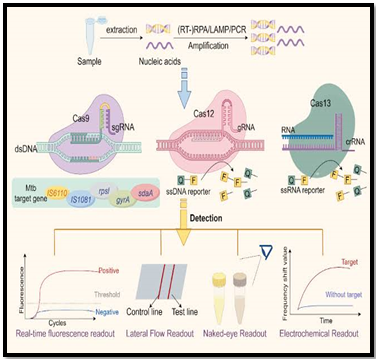ICMR’S BREAKTHROUGH TB DETECTION TECHNOLOGY
Why in the news?
- ICMR is rolling out a new, low-cost TB detection technology from its Dibrugarh center. This CRISPR Cas-based system, the cheapest TB test globally, can process 1,500 samples in two hours.
- The council is seeking partners to commercialize this technology, aimed at improving TB diagnosis in under-resourced health centers.
source:Springerlink
Technology Highlights
- The CRISPR Cas-based test uses saliva DNA to detect TB quickly and affordably, even with early symptoms.
- It’s designed for use in rural and primary health settings to address the issue of undiagnosed TB cases.
| About Tuberculosis
About:
Transmission:
Symptoms:
Infection Prevalence:
Treatment:
Associated Article: |




